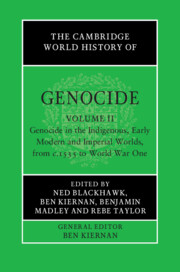Book contents
- The Cambridge World History of Genocide
- The Cambridge World History of Genocide
- The Cambridge World History of Genocide
- Copyright page
- Contents
- Figures
- Maps
- Tables
- Contributors to Volume ii
- Introduction to Volume ii
- Part I Settler Colonialism
- Part II Empire-Building and State Domination
- 4 A Case Lacking Contemporaneous Local Sources
- 5 Atrocity and Genocide in Japan’s Invasion of Korea, 1592–1598
- 6 The English Conquest of Ireland, c.1530–c.1650
- 7 Extirpation and Annihilation in Cromwellian Ireland
- 8 Genocide in the Spice Islands
- 9 ‘Too Furious’
- 10 The Destruction of Wendake (Huronia), 1647–1652
- 11 A ‘Spreading Fire’
- 12 The Qing Extermination of the Zünghars
- 13 A Vicious Civil War in the French Revolution
- 14 The Zulu Kingdom as a Genocidal and Post-genocidal Society, c.1810 to the Present
- Part III Nineteenth-Century Frontier Genocides
- Part IV Premonitions
- Index
6 - The English Conquest of Ireland, c.1530–c.1650
from Part II - Empire-Building and State Domination
Published online by Cambridge University Press: 23 June 2023
- The Cambridge World History of Genocide
- The Cambridge World History of Genocide
- The Cambridge World History of Genocide
- Copyright page
- Contents
- Figures
- Maps
- Tables
- Contributors to Volume ii
- Introduction to Volume ii
- Part I Settler Colonialism
- Part II Empire-Building and State Domination
- 4 A Case Lacking Contemporaneous Local Sources
- 5 Atrocity and Genocide in Japan’s Invasion of Korea, 1592–1598
- 6 The English Conquest of Ireland, c.1530–c.1650
- 7 Extirpation and Annihilation in Cromwellian Ireland
- 8 Genocide in the Spice Islands
- 9 ‘Too Furious’
- 10 The Destruction of Wendake (Huronia), 1647–1652
- 11 A ‘Spreading Fire’
- 12 The Qing Extermination of the Zünghars
- 13 A Vicious Civil War in the French Revolution
- 14 The Zulu Kingdom as a Genocidal and Post-genocidal Society, c.1810 to the Present
- Part III Nineteenth-Century Frontier Genocides
- Part IV Premonitions
- Index
Summary
This chapter demonstrates that when King Henry VIII and Queen Elizabeth and latterly Oliver Cromwell ruled in England the word conquest involved the deliberate slaying of many inhabitants in the area being subjected to conquest, and the taking of measures to ensure that the survivors would abandon their identity to become English and Protestant. This means that when the English government undertook to conquer Ireland during the 1580s and 1590s and again in the 1650s, it was launching campaigns that, by modern definitions, were genocidal in intent. The author shows that this reality was acknowledged by historians of Ireland, regardless of their religious and political allegiances to the close of the nineteenth century even if the terms they used a different vocabulary. The chapter then proceeds to explain why academic authors in Ireland during the first half of the twentieth century chose to discount these gory aspects of Ireland’s early modern past , and how the older verities have been rehabilitated to recent decades. The author throughout draws a distinction between the many massacres that occurred in Ireland during the sixteenth and seventeenth centuries and the attempted conquests, with associated intended genocides, of which there were but two.
Keywords
- Type
- Chapter
- Information
- The Cambridge World History of Genocide , pp. 139 - 162Publisher: Cambridge University PressPrint publication year: 2023

